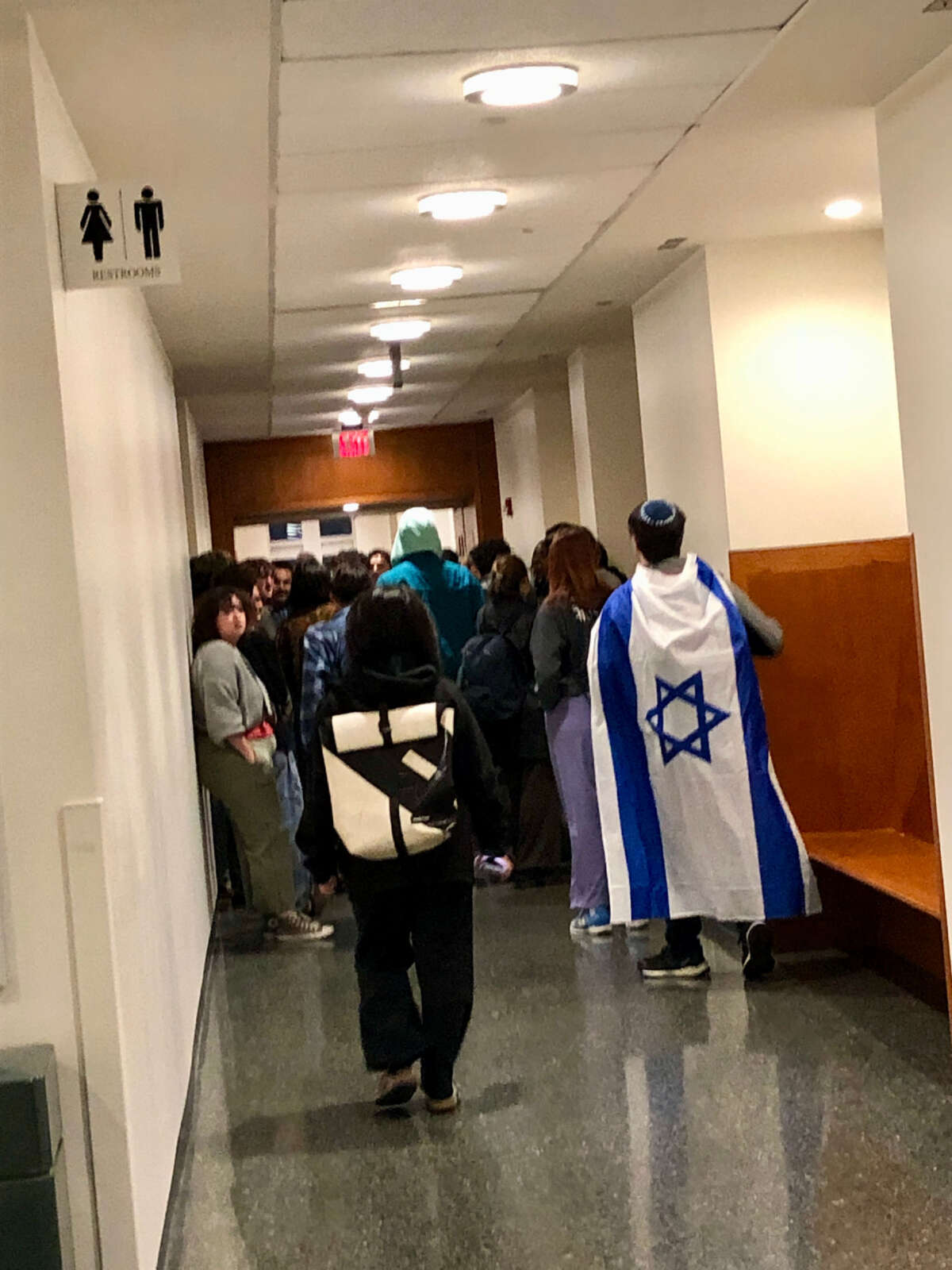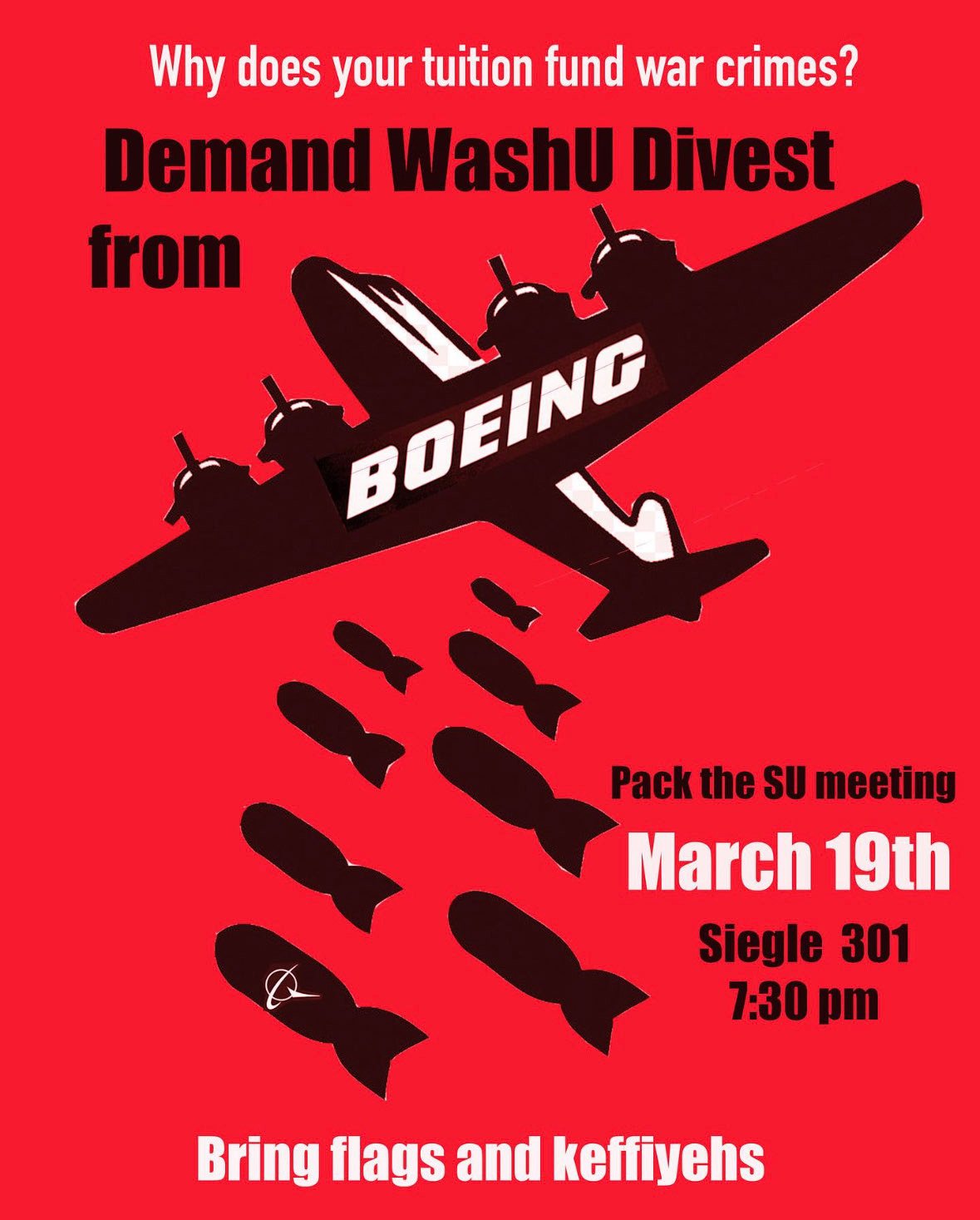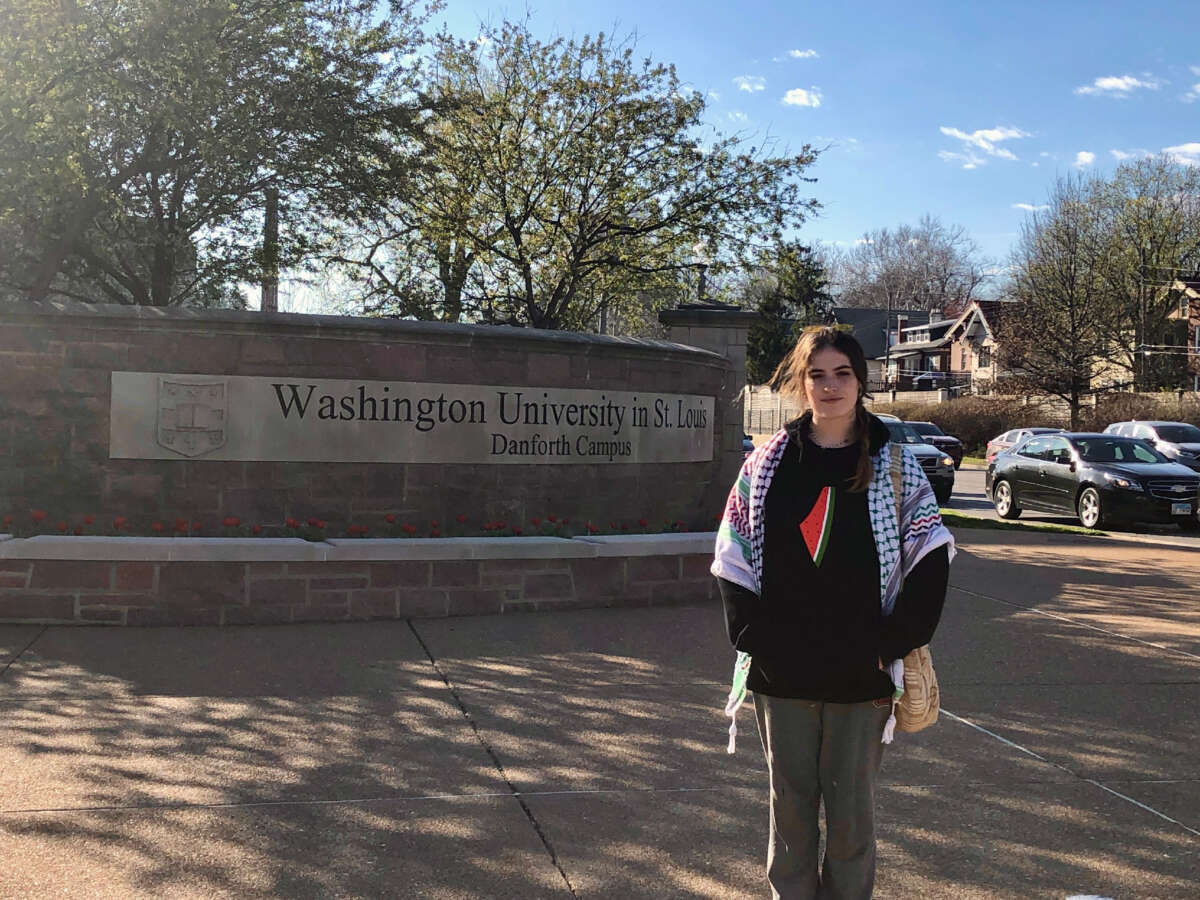At a nearly four-hour meeting on March 19, the student government at Washington University in St. Louis, Missouri, took formal action to address the human rights emergency in Gaza. More than 50 students spoke to the issue, and the resulting resolution that passed demanded the university demilitarize and democratize, materially and culturally.
By a vote of 15 “yeas,” five “nays” and one abstention, the school’s student union adopted a resolution that Sonal Churiwal, a sophomore currently serving as speaker of the student Senate, told the meeting she hopes will begin to answer the moral challenge posed by active-duty Air Force member Aaron Bushnell before he self-immolated: “Many of us like to ask ourselves, ‘What would I do if my country was committing genocide?’ The answer is, you’re doing it. Right now.”

Churiwal told Truthout the resolution seeks to return the student union, which was formed as a bail fund for war resisters during the Vietnam War era, to its roots of active engagement in pressing social issues.
“As we know, activism by young people was integral to the anti-militarist intervention movement during the Vietnam War,” Churiwal told Truthout, adding that now, half a century later, “This is another one of those moments where we as students have the power to enact change. It’s easy to get lost in this rhetoric of ‘We’re a bunch of 18- to 22-year-olds, what can we do?’ But reflecting on our history, there is a lot we can do.”
To stand by and be complicit seems, Churiwal said, “almost like an insult to our past.”
More than 50 years ago, campus antiwar protesters burned a building down on the St. Louis campus to express their outrage at the shooting of Kent State University students by the National Guard.
The “Divest from Boeing” resolution focuses on the school’s relationship with the defense contractor, which has manufacturing plants in St. Louis and whose weapons have killed civilians in Gaza, Yemen, Saudi Arabia and the United Arab Emirates. Boeing’s weapons have also been used in the Indian occupation of Kashmir, as well as military conflict on India’s borders with Pakistan and China.
The resolution directs the university to sever its close ties with the company manufacturing the very bombs that are falling on Palestinians in Rafah, Nuseirat and Gaza City. One of the clauses notes Boeing is also a top 10 polluter of air, water and land, and poses chronic risks to human health. A Boeing manufacturing plant is located just miles away from the campus.
The resolution does not hide its broader mission: to move the university toward ethical investing and naming opportunities (of buildings, research centers and professorships), and to gain more institutional power for students in those processes. Churiwal and other student senators credit its adoption to the advocacy work of student organizers in Resist WashU, Jewish Students for Palestine and the campus Muslim Students Association, but also that of Green Action, which has been attempting to shine a light on Washington University’s fossil fuel investment decision-making process for over a decade.
Andrew de las Alas, a member of the executive council, told Truthout that while the escalation of Palestinian genocide was an inflection point for this action, the resolution builds on undercurrents that have been brewing on campus for some time.
“There had been talks for the last few years of trying to reignite more activism on campus,” he explained. “This year, building off of multiple walkouts, protests, art sales, and other kinds of humanitarian and political actions, we started to think about ‘How can we actually bring some of these politics directly into student union?’”
He is conducting independent research where he thinks a lot about archives and the way the past is constructed, remembered and imagined.
“When we can demonstrate there was ideological, artistic, humanistic, and intellectual resistance at any given historical and political moment, I think that’s really important,” de las Alas said.

Howard Mechanic, a former Washington University student who figures prominently in the school’s storied past of war resistance, supports the student leaders who carried the resolution. Mechanic famously went underground for 28 years after being convicted of throwing a cherry bomb at the campus Reserve Officers’ Training Corps building the night it burned down after protesters torched it in outrage over the massacre at Kent State University on May 4, 1970. But the cherry bomb incident never happened, he said.
Mechanic told Truthout that in 1970, he and other antiwar protesters were working to oust the defense contractors with seats on the university’s governing board. He said the main culprits were McDonnell Douglas and Olin Chemicals, “but there were like five or six representatives of the military-industrial complex sitting on the university’s board of trustees. So obviously we had a disagreement with all those companies.”
Lesser known, he said, is the history of Washington University’s anti-apartheid divestment. “In 1969 and 1970, we were one of the first schools to move the board on an anti-apartheid divestment policy from South Africa when the movement was still in its infancy. So there’s a tradition of this type of student leadership at Wash U.”
Senior Dvora Redlich has become fascinated by the school’s history of resistance to oppression, and she lets it feed her. She’s an art student advancing to a master’s program in arts education who’s been contributing graphics for the campus Palestinian solidarity movement’s messaging. Redlich told Truthout she’d long been uncomfortably ambivalent about the relationship between Judaism and Zionism that she experienced worshiping in her family’s Reform Jewish congregation in Connecticut. But after October 7, she says, “something snapped.”
“There was a rupture, it made me sick. And it made me sick watching Wash U as a microcosm with its strong Zionist community,” she said. “It scares me. While the most pressing issue is Palestinian people being allowed to live, the thing that’s going to make people most antisemitic is slapping a Star of David on a genocide.”
Redlich attended Tuesday night’s meeting, occasionally handing out her artwork depicting images related to the genocide in Gaza printed on top of the university’s code of conduct. She’s researching surveillance on campus and is making art from images of the security cameras that are, as she has discovered, ubiquitous. She’s also documented campus police removing posters and flyers in support of Palestinian life, even the joyful posters of watermelon slices that have come to symbolize Palestinian solidarity.
She says the university’s approach to silencing protest so far has been relying on softer forms of repression like “surveillance and containment” and not mass arrests of demonstrating students like at the University of Chicago. But that’s not a given. “At any moment, that could come crashing down and they could start arresting people,” said Redlich.
Junior Natalia León Diaz, a student senator from Puerto Rico, told Truthout she started seeing the need for student union involvement when groups and students started to get targeted for the activist work they were doing.
“I knew then we needed to use our space and our connection with administrators, that it was the next step we needed to take,” she said. “That was what was missing.”
Speaking against the authoritarian crackdown
In the midst of a nationwide attack on civil liberties, Truthout urgently needs your help.
Journalism is a critical tool in the fight against Trump and his extremist agenda. The right wing knows this — that’s why they’ve taken over many legacy media publications.
But we won’t let truth be replaced by propaganda. As the Trump administration works to silence dissent, please support nonprofit independent journalism. Truthout is almost entirely funded by individual giving, so a one-time or monthly donation goes a long way. Click below to sustain our work.
